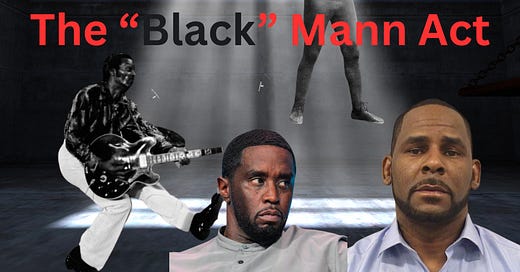The Verdict Is In: Partial Victory for Sean "Diddy" Combs
After seven intense weeks of trial and two days of deliberations, the jury has finally rendered its verdict in the high-profile case against Sean "Diddy" Combs. In what can only be described as a mixed outcome, Combs was acquitted of the most serious charges but found guilty on two counts related to prostitution.
Let's break it down: Combs walked away not guilty of the heaviest charges—racketeering conspiracy and sex trafficking by force, fraud, or coercion. These were the allegations that dominated headlines and threatened to put the music mogul behind bars for decades. However, the jury did find him guilty on two counts of transportation to engage in prostitution—one relating to his former girlfriend Cassie Ventura and another to a woman identified only as "Jane" in court proceedings.
Despite the split verdict, Combs remains incarcerated as the judge denied him bail under the Bail Reform Act, citing previous findings about Combs' potential danger to the community. Each count of transportation to engage in prostitution carries a maximum sentence of 10 years.
The Mann Act: A Troubling Historical Pattern
The prostitution-related charges Combs was convicted under fall under the Mann Act, a federal law with a complicated and controversial history—especially regarding its application to Black men in America.
The Mann Act, officially titled the White-Slave Traffic Act, passed in 1910, prohibits the transportation of "any woman or girl for the purpose of prostitution or debauchery, or for any other immoral purpose." While ostensibly created to combat human trafficking, the law has historically been wielded as a weapon against Black men—particularly those who challenged racial boundaries or achieved significant success. In 1978 and 1986, there were amendments to the law, making it gender-neutral and replacing references to “debauchery” and “immoral” purposes or practices with the phrase “any sexual activity for which any person can be charged with a criminal offense.”
Jack Johnson, the first Black heavyweight boxing champion who famously defied racial norms of the early 20th century, was one of the first high-profile victims of the Mann Act. In 1913, he was convicted under the law for traveling with his white girlfriend across state lines. The conviction was clearly racially motivated, driven by outrage over Johnson's relationships with white women and his dominance in a sport that white America considered its domain.
The pattern continued with music legends like Chuck Berry, who was sentenced to prison in 1962 under the Mann Act in a case fraught with racial undertones. More recently, R&B star R. Kelly faced Mann Act charges as part of his broader case involving sexual abuse.
The application of this law to Combs continues what many legal scholars see as a troubling pattern of using this specific legislation disproportionately against successful Black men in the entertainment industry. While each case has its own merits and circumstances, the historical context cannot be ignored.
A "Win" for the Defense, But at What Cost?
Combs' legal team has characterized the verdict as an "enormous victory," highlighting the acquittal on the most serious charges that could have resulted in life imprisonment. From a strictly legal perspective, there's truth to this framing—beating racketeering and sex trafficking charges represents a significant achievement for the defense.
But let's be real: any "win" here comes with substantial asterisks. Combs still faces up to 20 years in prison (10 years for each count). He remains in custody without bail. And perhaps most significantly, his reputation and legacy have been severely, possibly irreparably, damaged.
The months of damaging testimony, explicit evidence, and allegations of abuse, intimidation, and exploitation have permanently altered how the public views the once-revered music mogul. The court of public opinion doesn't operate on the same "beyond reasonable doubt" standard as criminal courts.
Reputational Damage Beyond Repair?
For decades, Sean Combs built an empire that transcended music—spanning fashion, spirits, media, and education. He cultivated an image as not just an entertainer but a business titan and cultural influencer. That carefully constructed persona now lies in ruins.
The trial revealed disturbing patterns of behavior that have shocked even longtime fans. Recordings of threatening phone calls, testimony about violent incidents, and allegations of coercion painted a picture starkly at odds with Combs' public image. Multiple civil lawsuits also remain active against him, ensuring that allegations will continue to surface.
Even with the acquittal on the most serious charges, Combs' career prospects appear bleak. Corporate partners have already distanced themselves from his brands. But most music streaming platforms have not removed his music. However, his ability to secure future business deals has likely been crippled.
In the entertainment industry, where perception often matters more than legal outcomes, the sheer volume and nature of the allegations may prove impossible to overcome. Unlike some celebrities who have rebounded from scandal, the severity and pattern of alleged behavior make Combs' path to redemption particularly steep, if not impossible.
A Domestic Battery Case at Its Core?
From a legal perspective, what's particularly interesting about this case is how it evolved. What began as a sprawling racketeering case with allegations of a criminal enterprise essentially ended up being treated by the jury as what many defense attorneys, myself included, characterize as a domestic violence case. It was not a federal case.
The prosecution built an elaborate case around allegations of a criminal organization, human trafficking, and systematic abuse. Yet the jury, after carefully weighing the evidence, essentially reduced it to what our office has seen countless times—a domestic situation involving alleged mistreatment between partners that crossed state lines.
At the Law Office of Mark Nicholson, we've represented numerous clients in domestic violence cases and understand how these situations can be complex, with allegations often not matching the legal definitions of crimes charged. The jury's decision to acquit on the more sensational charges while convicting only on the prostitution-related counts suggests they saw through some of the prosecution's more expansive theories.
The Broader Implications
This case raises important questions about how we prosecute high-profile individuals and the fine line between aggressive prosecution and overcharging. When prosecutors pile on charges in hopes that some will stick, it can lead to distorted perceptions of justice—both for defendants and victims.
It also highlights the continuing relevance of the Mann Act, a century-old law that many legal scholars have criticized as outdated and selectively enforced. The Act's vague language about "immoral purposes" has historically allowed for subjective and sometimes biased application. While modernized through amendments, questions persist about its role in contemporary criminal justice.
For victims of domestic violence, the case sends mixed messages. On one hand, it demonstrates that even the wealthy and powerful can be held accountable for their actions. On the other hand, the reduction of what was alleged to be systematic abuse to essentially transportation charges may feel like an inadequate response to the behavior described in testimony.
Legal Perspective: Why the Split Verdict?
As criminal defense attorneys, we often see juries reach compromises in complex cases, particularly those involving relationships where lines between consent and coercion become blurred in retrospect. The split verdict here likely reflects the jury's struggle to reconcile conflicting evidence and narratives.
The prosecution faced the challenge of proving beyond reasonable doubt that Combs' actions constituted a pattern of racketeering rather than isolated instances of misconduct. The defense successfully argued that while some behavior may have been inappropriate or even criminal, it didn't rise to the level of organized crime or forced trafficking.
This case demonstrates why having experienced legal representation is crucial in criminal cases. The difference between facing life in prison and a potential 20-year maximum sentence (which could result in much less actual time served) came down to the defense team's ability to challenge the prosecution's overarching narrative.
Looking Forward
As Combs awaits sentencing, the legal process is far from over. Appeals are almost certain, and the numerous civil cases against him will continue to unfold. These proceedings will likely reveal additional details and perspectives on the allegations.
For those watching this case, it serves as a reminder of several important truths: the justice system is imperfect; reputations built over decades can collapse in months; and the court of public opinion often renders its verdict long before a jury does.
At the Law Office of Mark Nicholson, we understand the complexities of high-profile criminal defense and the importance of protecting clients' rights regardless of public sentiment. While we weren't involved in this particular case, we recognize the significant challenges faced by all parties involved.
Whether this verdict represents justice depends entirely on one's perspective. For Combs and his legal team, avoiding convictions on the most serious charges constitutes a victory of sorts. For accusers, the guilty verdicts on transportation charges may provide some validation, even if they fall short of full accountability for the alleged behavior.
What's clear is that this case, like many involving allegations of abuse and exploitation, leaves no one truly victorious. The damage—to careers, to relationships, and to lives—extends far beyond whatever sentence is ultimately imposed.
If you or someone you know is facing criminal charges or dealing with domestic violence issues, contact the Law Office of Mark Nicholson for experienced, aggressive representation that protects your rights and fights for your future.






Proud of you ✊🏾 🙏🏾
From racketeering to prostitution? You can see them out walking all day every day. Hugh and Larry had mansions full of em. So he's Pimp Puffy in the Mack now. Smh.😒